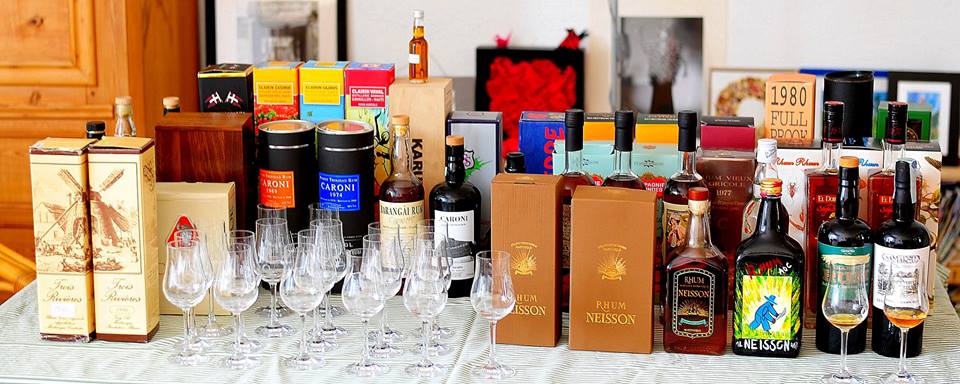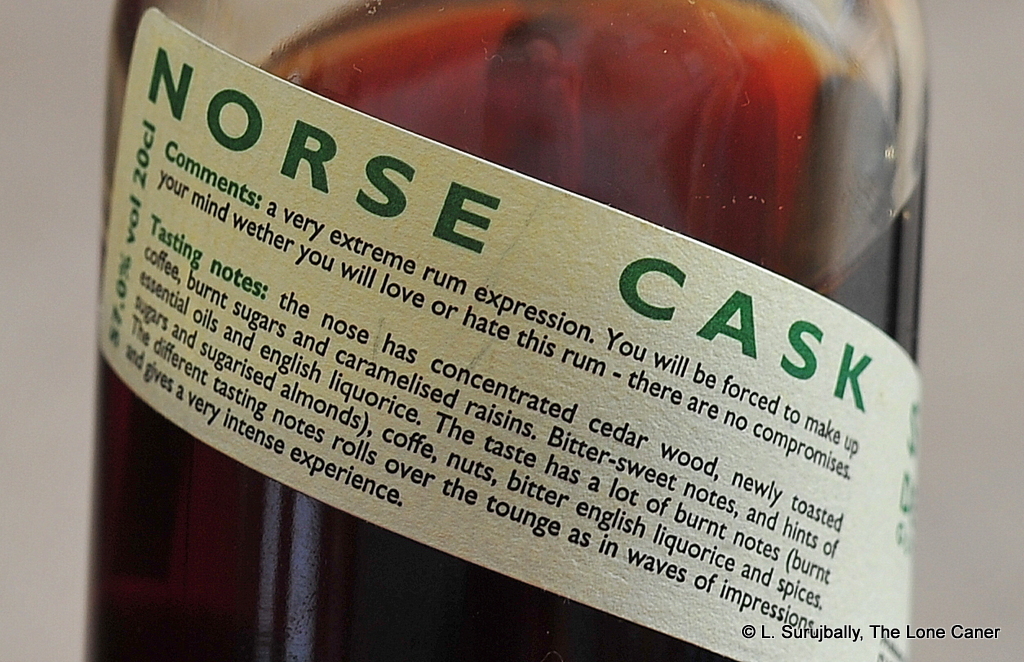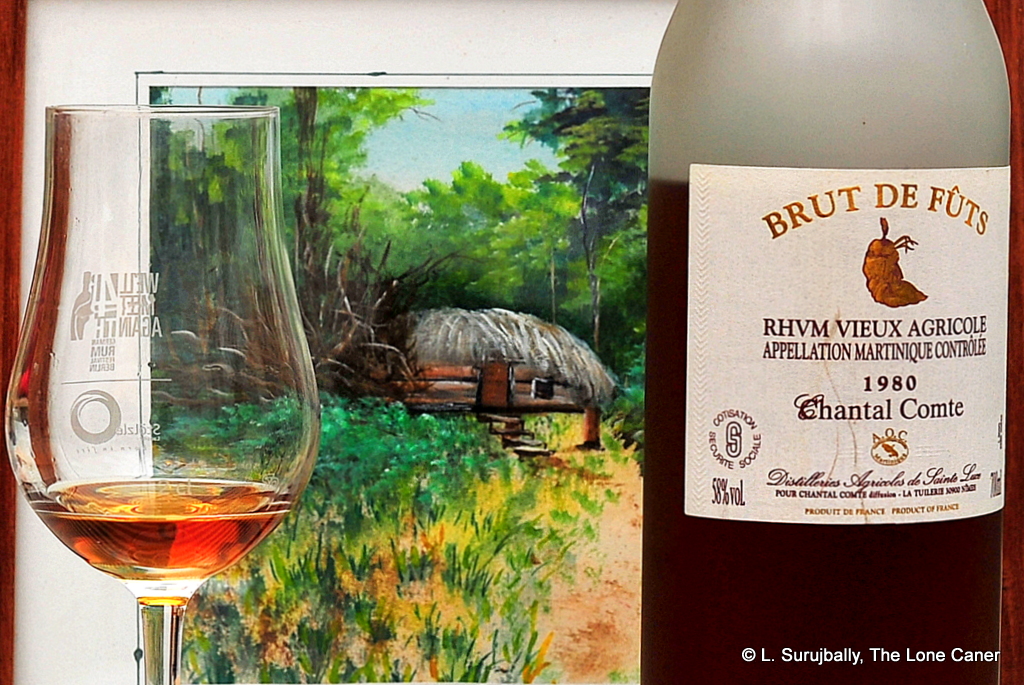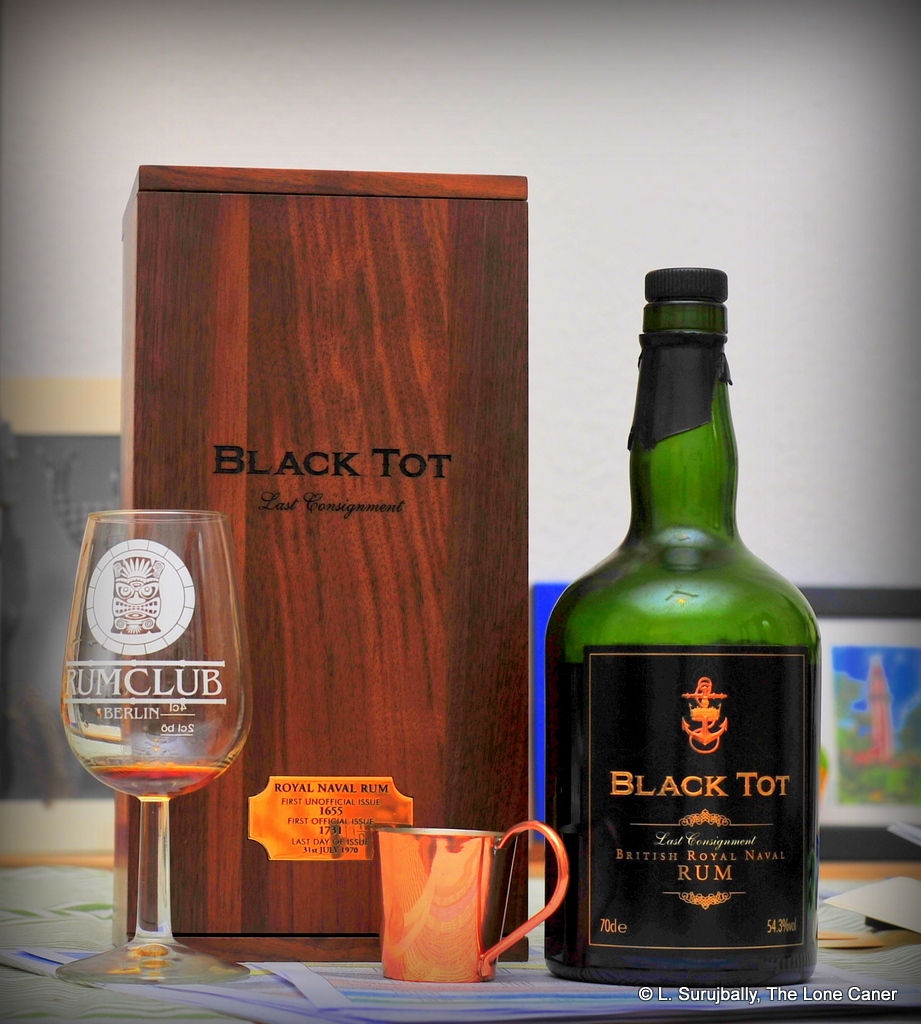***
I feel like a literary flea next to someone like Serge Valentin on Whisky Fun, who just published his 12,000th whisky tasting note. But you know, given the slender reach of my purse, the way I write and the time available to do it all, I’m not displeased with reaching this little milestone.
“About two or three years,” the Last Hippie (who now runs the site AllThingsWhisky) and I remarked to each other many moons ago, when we were discussing longevity. “Maybe a hundred or so rums.” That’s how long it was thought I’d be able to write for our origin site Liquorature. I had counted all the rums available in our local stores, and never seriously imagined it could get beyond that. I started writing in mid-2009, began posting in early 2010, and with one break, have kept on ever since. The hundred rums passed by the wayside, and now, if you can believe it, reviews are into their seventh year, the ‘Caner is passing the three hundredth essay (more if you count the Rumaniacs) and the whole exercise has thrown off branches in all kinds of directions unforeseen at the inception.
Wow. 300 reviews. I still stand back in astonishment every now and then when I see a number like that. Such a miniscule output will never impress Serge (640+ rums and counting) or Dave Russell (~380), or whisky sites which boast hundreds, if not thousands of reviews. Yet I can’t help but thump my scrawny mosquito-physique chest a little, because even though I’m small-fry compared to those guys, I still recall that time when I thought a hundred would be cool to do…and the idea of this many seemed beyond comprehension.
What accounts for it? Well, all kinds of things – a genuine love and interest in the subject, of course. It’s not a job, really, or anything remotely resembling the drudgery of work. I don’t have a boss (always nice). Unlike employment, I actually get (mostly) positive feedback that shows others share this interest, this passion. People communicate. And it’s not just enthusiasts, but producers, other writers, bartenders…I’m not a very sociable individual, but I now have more friends, in more countries around the world, then I ever imagined possible, and most are unstinting with advice, samples, corrections, assistance, background materials, commentary, photographs, or just plain old conversation. It was no accident that Henrik of Rum Corner, Cornelius of Barrel Proof, Gregers and I, were able to talk for six straight hours without repeating ourselves back in 2015, while damaging the hell out of some rums that for their age and price were utterly unobtainable for me back in 2009. Engagement with the broader community is alternately exasperating or educating. Most of the time it’s simply fun.
I always have this vision of some guy on a cold winter night, looking at a rum on a shelf, breaking out his phone to scan for a review, reading about it here, sighing at my long-windedness, but then maybe doing a double take, perhaps laughing, and then mumbling to himself, “This s.o.b. ain’t bad.” (Well, okay…I can dream, right?)
So a big thank you for all of you who have taken the time to read along, and who touch base from time to time. It’s not only because of you all, but for you all, that this site keeps running.
***
***
Everything below is a review of what’s been happening on the site, some thoughts of my own, and some statistics for those who are curious:
1. Most viewed reviews
The Bacardi 151, which I still think is the funniest, followed by the Velier biography, the latter of which remains the fastest climbing post, ever…it hit a thousand views in under an hour the day I put it up. The other two highly viewed articles which always surprise me are the Austrian Stroh 80 and the Cuban Guayabita del Pinar, neither of which are sterling standouts or on anyone’s must-have list, yet they keep chugging along, day after day. Quite astonishing for such niche products.
2. Least read article ever
The Jamel cachaca review (quite recent, so no surprise) and also the Canadian Momento Amber rum, which few would ever have found, let alone bought…it really wasn’t that good, more a backyard rotgut in my opinion. The Renegade Jamaica 2008 is also on the list (and that’s been around for ages), which kinda confirms my opinion that they were ahead of the curve all those years ago, and should have stuck with their special edition rum lines. With the rise of indie bottlers in the last years, they could have maybe been not only one of the pioneers, but in the lead.
3. My favourite rums of these 100, and new discoveries.
Leaving aside all the Velier rums (we all know they’re good, so let’s give somebody else a moment in the sun), here’s what I liked or which enthused me:
An expensive purchase but worth every penny. Over thirty years of ageing of a Demerara rum, leading to a magnificently rich and pungent dark behemoth. I now wish I had bought the full bottle instead of the smaller (but cheaper) version. If it had been no more than a raving taste monster dive bombing the palate, that would have been good enough, but when tried in conjunction with the Cadenhead from the same year (at <41%), it became clear why full proofs should be made more often.
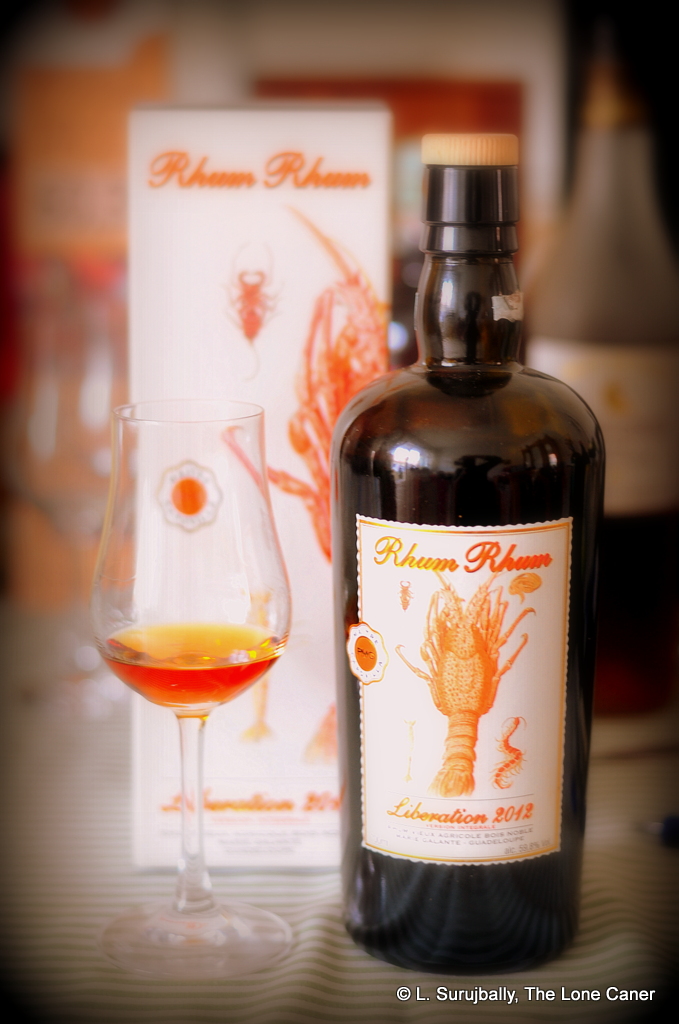 Rhum Rhum Liberation 2012 Integrale
Rhum Rhum Liberation 2012 Integrale
If there is ever a choice between the standard strength 2012 and the Integrale 2012, get the Integrale. This thing is an amazing agricole, so good that even regular rummies will have little too complain about. It may be among the best, if not the best, five year old rhum that I’ve been fortunate enough to sample, and proves once again that age is no indicator of quality.
Like my father, I mix erudition and peasantry in my character in equal and cheerful doses. The clairins unabashedly appeal to the lizard brain of the latter. They’re big, brutish, nasty taste hammers, unrefined and uncouth, yet, once we get past all that acetone and paint thinner, we remember something quite remarkable coiling around underneath. Some call that a “unique flavour profile”…I call it pretty damned good, and yes, I know I’m in a minority on this one.
Without a doubt, the best sub-ten year old rhum I’ve ever tried. Ever. At nine hundred euros, it was pricey — okay, it was more than pricey, it was near-divorce-level-pricey (the conversation started “I gave up a Prada purse for this s**t?” at overproof decibel levels, and went rapidly downhill from there). But man, that combination of sumptuousness and complexity was amazingly tasty, and showcased all the reasons why agricoles are great products we should never ignore just ’cause we never found one we liked.
I appreciate this rum not because of its intrinsic quality – though that wasn’t half bad – but because of its history and heritage. Sometimes you just get a rum because you want it, and I wanted this one for a long time.
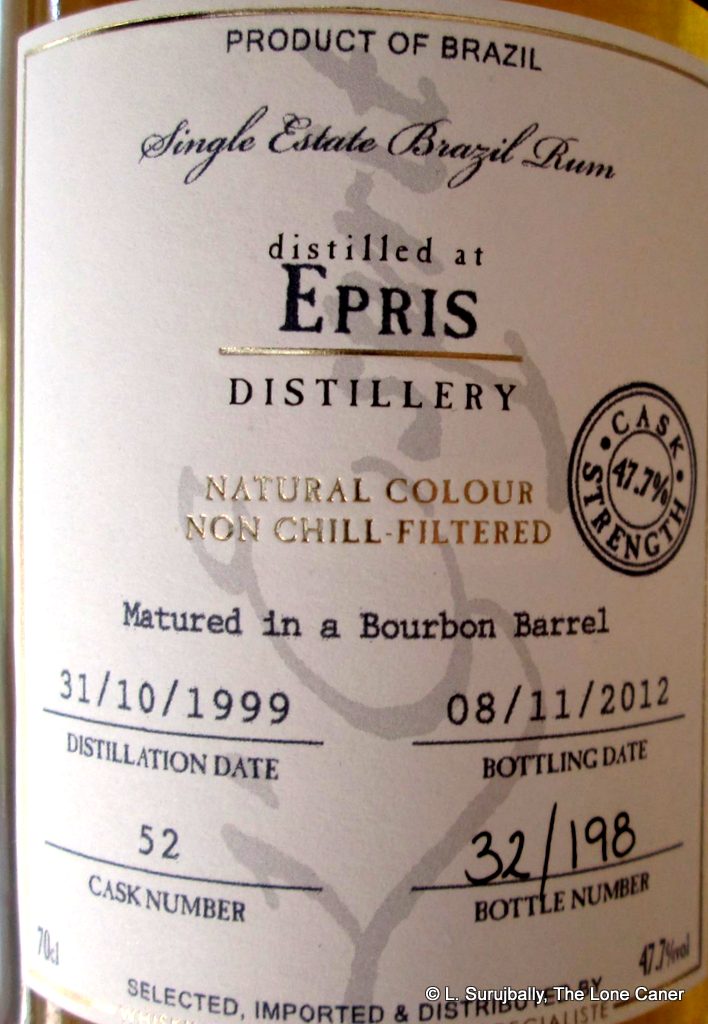 L’Espirit Epris Bourbon finished Brazilian Rum
L’Espirit Epris Bourbon finished Brazilian Rum
For a small outfit that is practically unknown outside of France, they certainly make some good hooch, these guys. This one might not have been a true cachaca, yet it exhibited markers of taste and style that was a cut above the ordinary. Purely on my appreciation of this one rum (provided to me gratis by Cyril of duRhum), I contacted the company to get more, just to see if they were as good as I thought they were.
Compagnie des Indes: Indonesia and Guadeloupe
Undoubtedly my new maker of choice for this one hundred reviews is CDI. I looked at Prichard’s, Nine Leaves, a raft of agricoles, and rums from around the world, and somehow the Indonesia stood out in my memory; and the Guadeloupe, issued at 43% was an excellent and affordable 16 year old rhum. While I may never get all of CDI’s products, I’m sure glad I managed to try these two.
***
4. Other bloggers’ articles
Like any serious interest, writing about rums requires keeping up with the news and issues of the day. More and more we are seeing bloggers put out informative and thought-provoking essays which enrich our understanding of the subculture. Here are some of the best articles I read while putting out my own hundred reviews. The quality of the thinking behind each heightens my appreciation for the writers who take the time to go beyond mere tasting notes and into informative corners of the rumworld which amuse, inform and educate:.
The Cocktail Wonk’s article on E&A Scheer
Matt Pietrek’s essays on the Jamaican distilleries were exercises in depth and detail, and I enjoyed them a lot, not least for the information they provided, but it was the one about E&A Scheer I found the most enlightening. All of us hear about independent bottlers buying casks from “brokers” without ever going further. Matt pulled back the curtain on what that actually meant, and how a very old company still provides stock for many of the small companies whose rums we appreciate. An enormously informative and entertaining read.
The Fat Rum Pirate: The World of Independent Bottlings
Wes Burgin from the UK has put out quite a few essays regarding sugar, quality in rums and other issues of the day. I don’t always agree with his arguments, yet that doesn’t invalidate the points he makes, and they always engender valuable discussions. This one was more factual than opiniated and pulled together many strands of the available information on who and what independent bottlers are.
Josh Miller at Inu A Kena: “Plugging into the Rum World” and the “Cachaca Challenge”
Josh and I are in contact off an on through social media, and I usually give him a good-natured ribbing about how he doesn’t write enough. That’s because I like what he writes, and what he does write is always worth a read. Two pieces he put out over the last year and a bit are worthy of mention (again): the summary of online websites dedicated to rums and cocktail culture, and the one where he pulled together fourteen cachacas at once to see how they stacked up in a caipirinha. I wrote to him after he published the latter and bemoaned my inability to get that many Brazilian rums at all, at which he laughed and told me his bar is always open to my tasting glass, if I ever get over to San Francisco.
5. Site focus in the next hundred
1. Continuing emphasis on agricoles
Moving into the French-style rumworld opened up huge vistas of enjoyment for me. Like many who started with the usual stuff, I disdained the clear, grassy profiles of agricoles, yet I plugged away and found that they grew on me. I found more quality rums here than I suspected. Of course, since I’m closer to Europe than to North America, it’s also easier to find them, and practically the entire French blogging community — many of whom I’m happy to know on a personal basis — is happy to chip in and point me to samples, overlooked gems and provide information.
2. Leaving the West Indies Behind
Naah…just kidding. The Caribbean will always remain the bastion of the spirit – more rums come from there than anywhere else. Yet it was and remains intriguing how many local rums there are from other parts of the world. I enjoyed CDI’s Indonesia, didn’t care for the Fijians, and I know there’s stuff from Africa, Australia and Polynesia that many of us have never even heard about. Everyone’s heard of Mount Gay or El Dorado….but it’s the weird ones from, oh, Mozambique, that I want to write about. So for the next few years I’ll be casting a much wider net than before, to see what I can come up with that some might have an interest in.
3. More cachacas
Just as with agricoles, I felt it was time to see what was going on in Brazil. I’ll likely not have the facility to pick up very many, but I’m trying to buy more than usual, and they will remain a focus of mine for the next few years. Also, as initially with agricoles, I currently don’t care for them much, so the only way to see whether I’m full of Kraken is to try as many as possible. Maybe I’ll find the gold nuggets in the mud which I’m absolutely convinced lurk in the backdam, awaiting only a persevering nose to ferret out.
4. More Essays
Maybe. This is a time issue more than anything else. Good essays have to express a cogently argued point of view and require a depth of research which takes a lot of time. But I’ll keep at it. The Makers section, if nothing else, needs to have more.
***
6. Trends in the rum world I continue to follow
Sugar/Additives
This is an issue that just won’t subside, and never should. It engenders enormous passions on all sides of the divide. I dislike the hysterical adamance of the purists who sneer at and denounce anyone who likes a sweetened rum, but I’m equally at war with those producers who refuse to disclose additives of any kind under the guise of it being legal. Legal or not, the consuming class is a far cry from the sheeple who accepted everything as little as five years ago, and it’s vocal proponents of disclosure who are making raising awareness a problem that new entrants to the field cannot afford to ignore. I can hope, I guess. Sugar will never go away — it’s too tightly interwoven with the culture of rum — but maybe we can look forward to a day when people get a full brief on what they’re pouring into their glass. People are welcome to like whatever they like, and if we have our way, at least they’ll know why.
Classification
The old standard of grading or classing rums by colour is more or less dead, yet the influential “styles” of Mr. Broome is proving a tougher nut to crack. As with many things, it’s the adaptation to exceptions that show how good the rules are. Here, not so much. More and more we are seeing agricoles issued in other places than the French islands; blends of rums from multiple regions make their appearances more often than before; additives are nowhere to be found; and the difference between pot still and column still rums continue to confound many. Luca Gargano’s system is a step in the right direction, though I still think it does not address outliers satisfactorily, and by ignoring the immediate source of the distillate – molasses, sugar cane juice or “other” – an opportunity may have been lost to win wider acceptance. Still, no matter how it ends up, the issue is definitely getting the attention it deserves.
New Entrants
It’s an old joke that “rum is the next big thing … and always will be”. Yet nothing suggests the acceptance of the spirit as a class act in its own right as the explosion of smaller micro-producers, especially in the US and Canada, and the surge of independent bottlers in Europe. People are getting fed up with the high price of scotch, maybe, and constant blogging has made everyone aware that rum takes second place to no spirit at the top end. Rum Nation, Plantation, Samaroli, Velier, Moon Imports, Berry Bros., Fassbind…these are decades-old companies who are finding their place in the sun courtesy of a new crop of writers and bloggers who champion their work, but others are muscling into the market as well: L’Espirit, Ekte, Compagne des Indes. The sheer variety is astonishing and there’s something for every taste, from brute force mastodons at 60% to milder palate pleasers at 40%.
Cask Strength
Nothing pleases me more than the move at the top end to move past 40-43%. The indies mentioned above were always issuing such rums, of course, in a bottle here and there, and Renegade, who perhaps were ahead of the curve but then dropped out, created one of the first “lines” of rums that took this to 46% in their limited editions. But perhaps it is Velier we should thank for kicking off the trend, because not only are the majority of independent bottlers now issuing rums at strengths between 50-65% but the big guns like FourSquare, Mount Gay, and DDL are catching on and doing the same. I look forward to the day when all standard strength rums made by big companies are issued alongside their premium beefcake brothers so consumers can pick one or the other depending on taste.
Truth in Advertising and Disclosure
Too many makers are stuck in the pre-social-media world. It seems to escape many of them that there is a vocal and knowledgeable community out there that disseminate information faster that was ever possible before. Agreed, most people who like rum simply want an opinion they can rely on (hence the rise of bloggers and online reviewers, since only a fool trusts a company website touting its own quality), but what annoys the Twitterati and Facebook Faithful more than anything else is (a) the lack of disclosure on labels or online materials as to what is actually in the rum, i.e. additives and (b) what the rum is made of, and how, what still, from what raw stock, aged for how long. Like it or not, people want to know this stuff, which is why Arome (which I have not tried) got an online faceful for being not only evasive but outright condescending. This of course traces its genesis to the sugar imbroglio from above.
***
And so there you have it. One person’s ramblings about rum, the rum universe and our place within it. I realize with every passing year that not only will I never taste them all, but can only ever scratch the surface of the sometimes bewildering variety available to us fortunate souls (at a still reasonable cost compared to that obscure Scottish drink). If I were to give a single piece of advice to anyone regarding rum – especially those now getting interested – it’s to never stop with just one, but try many, just to understand how wide an area the rumiverse actually covers. I learn something new every week, make new discoveries and it remains a remarkable experience.
So, walk a little further down the rum road with me. There’s more coming. There’s always more coming.
Thanks to all of you who have read not only this far in this essay, but overall. Your comments and visits are valued, and welcome, and appreciated.
All the very best
The Lone Caner

